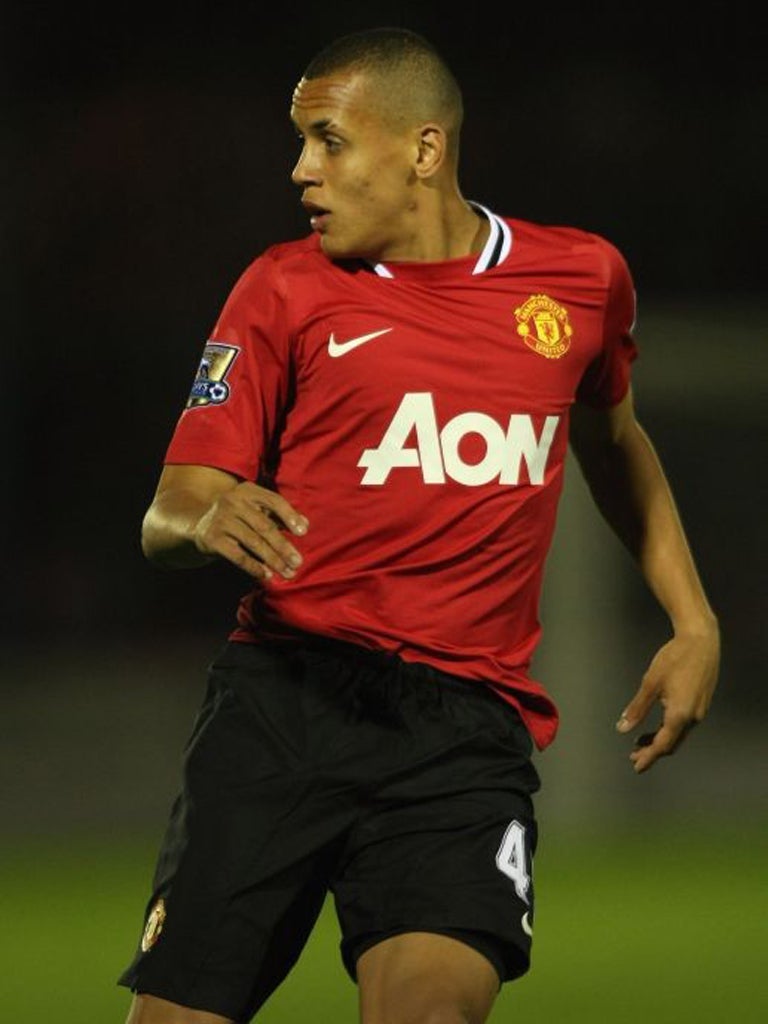Sam Wallace: Morrison's troubles throw the spotlight on teenage talent

Goodness knows, football has had its bad boys, its rebels and its malcontents over the years. But there has never been a case like that of Ravel Morrison, a boy who has played just three games for Manchester United's senior team, yet, at 18, has become as well known as some of his more experienced first-team counterparts. That the description "troubled" is more often than not placed ahead of his name is newspaper shorthand for a whole host of problems not easily squeezed into one line.
Morrison (right), seen as one of the most gifted to come out of United's academy in years, is out of contract in the summer, with the club despairing at his behaviour. He pleaded guilty to two counts of witness intimidation last year and was placed on a referral order that expires this month. He has a police caution for assaulting his mother. There have been other disciplinary problems at United.
On Friday, Sir Alex Ferguson announced that the player had rejected the club's contract offer and had been "unrealistic" in his demands. A bid from Newcastle United has been rejected. Morrison had previously tweeted that no contract has been offered.
This is not a story of a talented player with trouble attached. This has become a narrative of trouble with talent tagging along for the ride. United will doubtless grumble about the relatively intense media coverage of the player. Everyone wanted to know more about a kid with the potential to be the new Paul Scholes.
But the interest in Morrison also says something about the way the struggle to sign or develop the best teenagers has become more highly charged and high-profile than ever. The market in young footballers is almost as ruthless, as lucrative, and as global, as that for established players. With everyone chasing the Barcelona utopia, it has taken on a new significance.
Witness the urgency with which the Premier League strong-armed the Football League into rewriting the academy rules under the new Elite Players' Performance Plan (EPPP) last year. EPPP, effective as of next season, has changed the landscape. The recruitment of elite youth players is near the very top of most big clubs' agendas.
Increasingly, the biggest agents pour resources into scouting and recruiting players in their mid-teens. The clubs are, in the main, tolerant of the recognised agencies. It is the one-man-band, office-above-a-Chicken-Cottage brigade they worry about. And if the clubs complain that they are victims of media hype and rapacious agents, they should recall it is they who inflated the wages and changed the system beyond all recognition from the old-style apprenticeships, especially by signing foreign academy players. Changed it to the extent that in one youth team there could be some 17-year-olds on £200,000-plus a year and others on a scholar's wage of £115 a week.
Once, the first time a young player would have had any public profile would have been his senior debut. Now, in-house channels like MUTV, Chelsea TV and LFC TV show academy matches or highlights. The interest in academy and reserve and/or development teams has increased considerably.
With Morrison, United seem to be faced with a daunting dilemma. As the son of parents who taught for 40 years in the state sector, I am well aware of the anguish that goes into a decision to exclude a child from school. A balance has to be struck between the interests of the individual and those of the other students. With Morrison, the decision facing Ferguson and his academy director, Brian McClair, on keeping a player also has sporting and economic dimensions. This could one day be a £30m footballer they are potentially allowing to walk away for nothing. What if he goes elsewhere and thrives?
Almost four years ago, I interviewed McClair and flippantly asked him if he would "ever fancy a big job one day". "I've already got a big job," he replied. Think about it. He has to produce players for one of the most famous clubs in the world, one with an expectation of its academy born of its history.
Now he has to help make the call on Morrison's future, a situation unprecedented at United to my memory. Is academy director a big job? To my mind it is second only to the manager these days.
Subscribe to Independent Premium to bookmark this article
Want to bookmark your favourite articles and stories to read or reference later? Start your Independent Premium subscription today.

Join our commenting forum
Join thought-provoking conversations, follow other Independent readers and see their replies